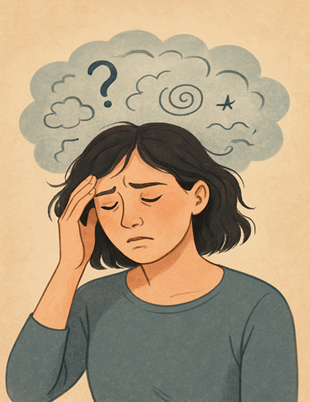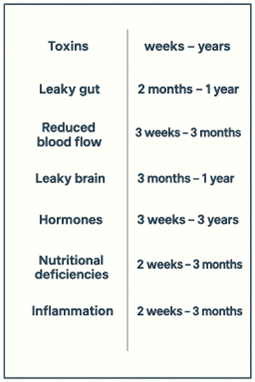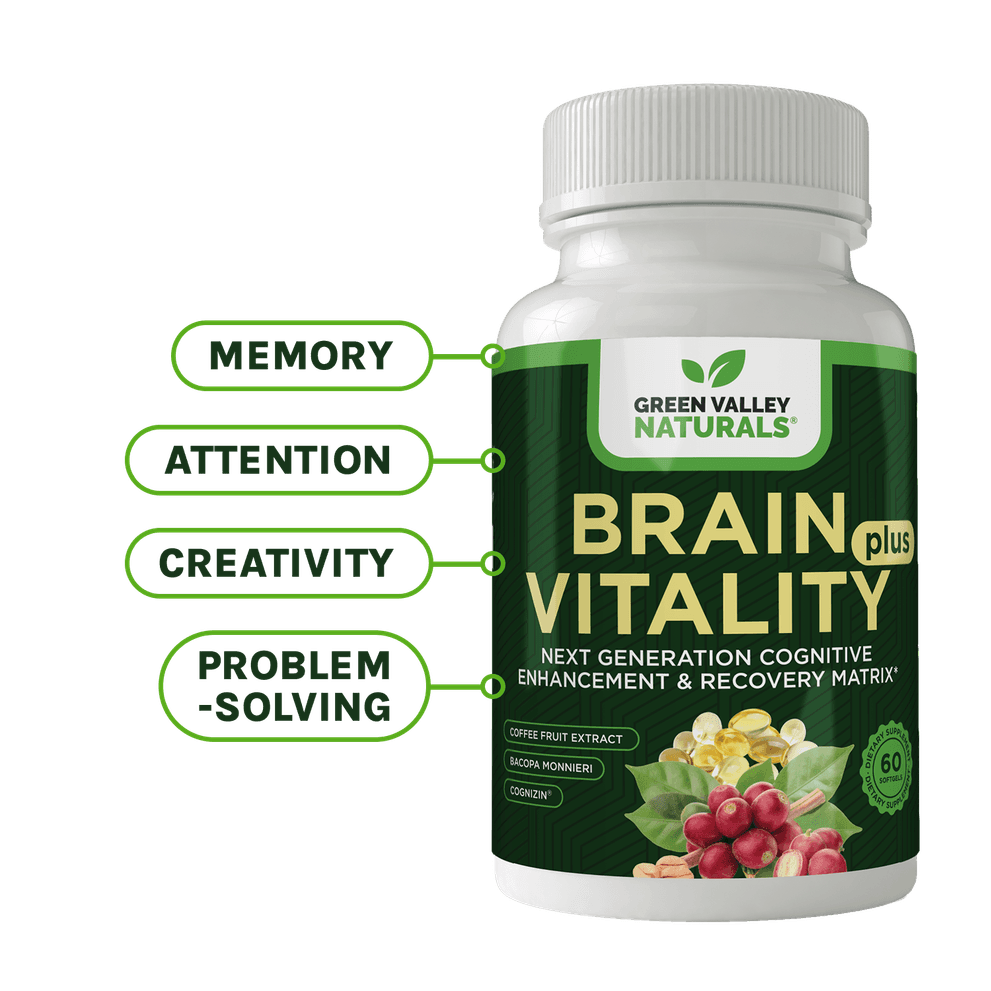
Struggling to decide what clothes to wear today or what to eat for dinner? When you have brain fog, even everyday tasks can seem overwhelming. Not to mention trying to make major health or financial decisions.
How long the haze hangs around depends on why it started in the first place. From short-lived sleep problems to chronic hormone imbalance, poor gut health, or long COVID, this guide shows you what typically prolongs the fog—and what actually shortens it—so you can reclaim clarity sooner.
Key Takeaways
Duration varies. The duration of brain fog can be just hours or days or stretch to months or even years, depending on its cause, a person’s general health, other illnesses that go alongside it, and the effectiveness of treatments.
Healing takes time. Resolving it can be complex as multiple factors and different body systems are often intertwined that will need the help of medical professionals to unravel.
Lifestyle matters. Recovery can be sped up by making dietary and lifestyle changes and taking specific nutritional and herbal supplements.
When Brain Fog Strikes Temporarily...

When your brain suddenly feels “offline,” it’s often a tripped switch—not a broken system. Short-term events can scramble chemical, electrical, or hormonal signals and leave you hazy, but the good news is that many of these triggers are simple to spot and quick to fix. Before you worry about complex causes, start with the low-hanging fruit: everyday factors that, once addressed, can restore clarity in hours or days.
8 Easy-To-Fix Causes of Brain Fog Symptoms
Lack of sleep: One in three Americans sleep less than the 7 to 9 hours needed. Under sleep deprivation or with poor-quality sleep, it’ll be hard to think straight the following day.“We were fascinated to observe how sleep deprivation dampened brain cell activity. Unlike the usual rapid reaction, the neurons responded slowly, fired more weakly, and their transmissions dragged on longer than usual," explained Dr. Itzhak Fried, Professor of Neurosurgery, UCLA.
Acute stress: In your mail is an unexpected and very large bill. The stress can numb the brain, making it impossible to function for hours or even days on end.
Food intolerances and allergies: Whether inhaled or ingested, the reaction to allergens can slow thinking, stifle concentration and blunt the memory.
Blood sugar dips and spikes: The brain needs a steady supply of glucose, so skipping meals or eating sugary foods can cause mental fuzziness.
Dehydration: The brain is very sensitive to water loss, so even mild dehydration can impair cognition.
Menstrual cycle: The run up to woman’s period can affect thinking and memory related to changing hormone levels. So can the hormonal imbalances of peri-menopause and menopause.
EMF exposure: Constant exposure to electromagnetic fields from cell towers, Wi-Fi and devices can cause cognitive dysfunction in sensitive people.
Medications: Many drugs can interfere with thinking and memory, but sleep aids and pain medications are the most common culprits.
Of course, this list is only the beginning. Other common causes of brain fog can be harder to identify and resolve. As one sufferer posted on Reddit: “My body doesn’t feel like mine and I feel completely disconnected from my body.”1 In these situations, the fog may not lift for weeks, months, even years.
When Brain Fog is Chronic
Many experienced chronic foggy thinking for the first time with COVID, but this viral infection is only one of the many reasons why brain fog takes hold. Stubborn brain fog often reflects overlapping drivers that tangle multiple body systems. In these cases, quick fixes rarely work because the brain is reacting to a web of signals rather than a single trigger. Let's take a closer look at many of the causes behind chronic brain fog.
Environmental toxins and pollutants
There are tens of thousands of artificial chemicals, toxins and heavy metals in the environment. There’s no getting away from them as they’re in the air we breathe, the liquids we drink, the food we eat and the things we touch. Their buildup in the body can reach a critical point where they now impact brain function. In fact, evidence from the U.S. National Health and Nutrition Examination Survey demonstrates a significant association between environmental toxin exposure and the emergence or persistence of brain fog symptoms.
One strong environmental trigger of brain fog is mold. The spores and mycotoxins they produce lead to damage from free radicals (oxidative stress), brain inflammation and disrupted communication. The result is slow thinking, poor concentration, forgetfulness and more. These symptoms are likely to persist until medical chelation or other methods of detoxification reduce the toxic load, after which recovery can begin. Speed of recovery is highly variable, taking weeks, months or possibly years.2
Leaky gut
If the gut microbiome gets tilted towards an oversupply of “bad” bacteria and an undersupply of “good” bacteria (dysbiosis), this can open the intestinal barrier allowing toxins, bacteria and undigested food particles to leak into the blood stream and set off an inflammatory cascade. Since the gut and brain are linked through the gut-brain axis, these inflammatory molecules can travel to the brain to cause brain fog.
Healing the gut, closing the intestinal barrier and ending cognitive issues by making dietary changes and taking specific supplements can take anywhere from a few months to a year.3
Reduced cerebral blood flow
Blood delivers essential oxygen and nutrients to the brain. If the supply is slowed, cognitive function will be impaired. Improving circulation with medical interventions, nutrients, herbs and lifestyle changes can take weeks to several months.4
Leaky brain
The blood-brain barrier (BBB) keeps toxins and inflammatory molecules at arm’s length, but if it becomes compromised, it can lead to neuroinflammation and brain fog. Repairing it with lifestyle changes and nutritional support can take several months to a year.5
Hormone imbalances and deficiencies
"There’s evidence that hormonal fluctuations, like those in menopause or thyroid disorders, can alter brain chemistry and connectivity, making people feel foggy or cognitively slowed," explains Dr. Lisa Mosconi, Director, Women’s Brain Initiative, Weill Cornell Medicine.
Low levels of thyroid hormone can dull the brain, as can low levels of testosterone in both men and women. Addressing these issues can resolve mental sluggishness in weeks to months.
It can also become prominent during perimenopause and the first year after menopause. “Menopause brain” normally resolves completely but can take as long as two to three years.6
Similar issues can occur with “pregnancy brain”, although fatigue, stress and morning sickness may also play a role. If the latter, brain fog will lift as nausea subsides but if caused by hormonal imbalances and other factors it may continue until well after birth.7
Nutritional deficiencies
The brain needs a wide range of nutrients to function at its best. Low intake or inadequate absorption of key nutrients can lead to poor memory, difficulty concentrating and mental fatigue. Restoring balance can take a few weeks to several months.8 Common deficiencies related to brain fog include:
B12 deficiency: This vitamin is essential for healthy brain function; Deficiency is vastly underestimated as people can have symptoms even when a blood test shows they’re within the normal range. When corrected, cognitive function improves within weeks.
Iron deficiency anemia: Insufficient iron reduces oxygen delivery to the brain, slowing cognitive processes. Mental clarity improves within one or two weeks, but full recovery can take several months.
Inflammation
Chronic, low-level inflammation from disease, injury, infection or stress disrupts brain cell communication and hinders its ability to process information. Reducing inflammation with lifestyle changes can take a few weeks to several months.9
Once any of the above is discovered as a likely cause, healing can take place, but it will vary from person to person depending on how long the problem has continued, whether a traumatic brain injury has ever been suffered, and the individual’s age, healing rate and other co-existing illnesses.
Often the underlying cause is difficult to determine without the help of medical professionals who will need to take a medical history, conduct a physical examination, carry out cognitive tests, blood tests and possibly a brain scan. At other times what brought it on is much clearer.
For instance, infections that cause Lyme disease, glandular fever and influenza are known to be accompanied by brain fog, but the infection-brain fog issue was only thrust into the limelight by a certain virus that only came along late in 2019.
Long COVID
After just recovering from COVID-19, Courney was looking forward to lunch with friends, except they never showed up. She’d checked the address before she drove off yet ended up at the wrong restaurant. “I sat at the table for half an hour wondering where everyone was.” That was one of her many episodes of confusion, memory loss, and trouble finding the right words.10,
Others, when asked how does brain fog feel, describe their experience as “my brain is in slow motion” and “every single day is going by in a blur.”11
The problem is thought to be caused by inflammation from an overactive immune system – which makes it harder for brain cells to communicate with each other - and by a leaky blood-brain barrier, restricted blood flow and reduced nutrient delivery.
Those affected should notice improvement within three months after the infection subsides and fully recover in six to nine months, but in rare cases COVID brain fog duration may extend to eighteen months and well beyond.
In fact, one study projected that some people won’t recover for a full 5 years!12 The research shows the wide variation in recovery rate comes about because many parts of the brain may be involved and need time to repair, and psychological factors may also come into plays either caused by COVID itself or that brain fog caused, such as anxiety, depression and post-traumatic stress.
Many people also have other conditions that affect recovery time such as high blood pressure, heart disease and diabetes. Recovery will be improved if these conditions are treated alongside COVID.
Anna Nordvig, a neurologist at Weill Cornell Medicine in New York explains, saying. “In our clinic, we see a lot of comorbidities. These conditions, as much as COVID itself, may be contributing to that overall cognitive dysfunction.”13
How Long Does Brain Fog Really Last?

Brain fog isn't a one-size-fits-all condition. If your mental cloudiness stems from nutritional deficiencies or inflammation, you might start feeling clearer within just 2 weeks to 3 months of addressing these issues. 14
The most stubborn cases of brain fog often involve complex underlying issues that take time to heal. Problems like leaky gut syndrome, compromised blood-brain barrier (leaky brain), or significant toxin buildup can persist for months to years because your body needs time to repair damaged systems and eliminate harmful substances.
On the bright side, issues related to poor blood flow, nutritional gaps, or inflammation tend to respond much faster—sometimes showing improvement in just a few weeks once you start targeted interventions like proper supplementation, dietary changes, or lifestyle modifications.
How Can You Get Rid of Brain Fog?

As you can see, brain fog has multiple causes and if you don’t know the culprit – and there can be more than one - then it’s important to seek medical advice.
As Dr. Nordvig explains, “We are learning that brain fog is really complicated. There's not just one thing that you can measure and then fix. There are likely dozens of different factors…that are affecting a lot of different bodily systems that ultimately lead to this cognitive dysfunction.” This means the brain fog timeline is uncertain and can continue for some time in difficult cases.
Take The Right Nutrients
Many of the best brain-boosting supplements work by replenishing key nutrients your brain needs to function at its peak.16
Omega-3 fatty acids (especially EPA and DHA) protect neurons, reduce inflammation, and help improve memory and mood.
B-complex vitamins—especially B6, B12, and folate—are essential for energy metabolism and neurotransmitter function, and their deficiency is strongly linked to brain fog and poor focus.
Vitamin D3 is another overlooked powerhouse that supports nerve health and gene regulation and has been linked to improved memory, mood, and cognitive resilience.
Try Herbal Nootropics and Adaptogens
These also offer significant brain support by enhancing neurotransmitter activity and protecting against oxidative stress.
Lion’s Mane mushroom stimulates nerve growthand improves memory.
Bacopa monnieri enhances learning and attention while reducing anxiety-related fog.
Skullcap helps relieve anxiety and supports serotonin and dopamine balance.
Ginkgo biloba boosts blood flow to the brain, while Silk Protein Hydrolysate (FEH) and
Phosphatidylserine (PS) protect neuronsand support brain structure and signaling.
Citicoline (Cognizin®)and Coffee Fruit (Neurofactor®). These advanced ingredients ltake brain support to the next level. They work by increasing brain-derived neurotrophic factor (BDNF), which promotes the growth and survival of brain cells. They also increase mental energy, sharpen focus, and reduce mental fatigue.
Improve Your Lifestyle
The following lifestyle strategies are recommended by Sabina Brennan, a neuroscientist at Trinity College Dublin, Ireland, and author of Beating Brain Fog.15
Sleep well: Sleep helps brain cell signaling by promoting the clearance of cellular waste, so put into practice as many of these ten sleep tips as you can to prevent sleep deprivation and get a better night’s sleep.
Manage stress: Deep breathing, meditation, gentle yoga, tai chi, and brisk walking all help to relax the body and mind. Or get professional help with cognitive-behavioral therapy.
Get active: “Physical activity really is one of the best things you can do for your brain to keep it sharp,” says Dr Brennan. “With regular physical exercise people will see improvements in memory, attention and the speed in which you can process information.”
Eat well: Dr Brennan recommends the Mediterranean diet because it contains a wider range of healthy foods and nutrients than other diets.When selecting brain supplements, look for clinically studied forms, proper dosages, and formulas free of fillers. Pairing these ingredients with the lifestyle changes mentioned can provide a strong foundation for lasting cognitive clarity.
Summary
Brain fog has many triggers and therefore many timelines. Short, reversible causes—poor sleep, acute stress, dehydration, blood sugar swings, food reactions, certain meds—often lift in hours to days once corrected. Longer-running fog commonly involves deeper drivers such as mold/mycotoxins, leaky gut, low cerebral blood flow, a “leaky” blood-brain barrier, hormonal shifts (thyroid, testosterone, perimenopause/menopause, pregnancy), nutrient gaps (B-vitamins, iron, vitamin D), and chronic inflammation. Long COVID brain fog typically improves within 3–9 months but can persist longer when comorbidities are present. Recovery speeds up when you identify and treat the root cause(s), optimize sleep, manage stress, move regularly, adopt a Mediterranean-style diet, and consider evidence-informed nutrients and nootropics (e.g., omega-3s, B-complex, vitamin D, lion’s mane, bacopa, sage, ginkgo, citicoline, coffee fruit). Seek medical help if symptoms persist or impair daily life.
Frequently Asked Questions
How long does brain fog last?
It can range from hours to years depending on the underlying causes, the patient’s overall health and other illnesses the affected person has.
Is brain fog permanent?
No, it’s temporary for the vast majority of sufferers. But if it comes with a medical condition for which there is no cure, such as an autoimmune disease, then for many patients it will remain an ongoing problem.
How long does COVID brain fog last?
Once the initial COVID infection has subsided, brain fog should start to lift after a few months but may linger for up to nine months. For a small minority it will persist for longer.
What causes brain fog to persist?
If the root cause is unresolved, then it will persist until the body either heals itself on its own or the issues are eventually addressed and solved through a combination of medical treatment, lifestyle changes and natural remedies.
When should you worry about brain fog?
If brain fog symptoms persist for some weeks, they’re interfering with day-to-day life, and strategies to alleviate them haven’t helped, it could signify serious underlying conditions such as depression or dementia so it’s important to talk to your doctor about your concerns.
1, 11 Persistent Somatic Symptoms Understanding ‘brain fog’: insights from Reddit discussions 3 March 2024
2 ImmunoLytics Mycotoxins and Neurotoxicity Part 1: Brain Fog January 31, 2023
3 Casa de Sante Can Leaky Gut Cause Brain Fog June 28, 2023
4 Wells R, et al. Cerebral Blood Flow and Cognitive Performance in Postural Tachycardia Syndrome: Insights from Sustained Cognitive Stress Test J Am Heart Assoc. 2020 Dec 15;9(24):e017861.
5 Medical News Today Blood-brain barrier leaks may be to blame for brain fog in long COVID March 4, 2024
6 The Conversation Menopause and brain fog: why lifestyle medicine could make a difference August 12, 2025
7 nutrisense Period Brain Fog: What's the Science? August 4, 2023
8, 16 Newsweek Common Signs Your Brain Could Be Lacking These Five Nutrients Aug 24, 2023
9 Kavanagh E. Long Covid brain fog: a neuroinflammation phenomenon? Oxf Open Immunol. 2022 Sep 27;3(1):iqac007.
10, 13, 15 Sukel K. Lifting the fog New Sci. 2022 Jun 11;254(3390):38-41.
12 Fernández-de-Las-Peñas C, et al. Trajectory of post-COVID brain fog, memory loss, and concentration loss in previously hospitalized COVID-19 survivors: the LONG-COVID-EXP multicenter study Front Hum Neurosci. 2023 Nov 9;17:1259660.
14 Cleveland Clinic Brain Fog 05/14/2024





